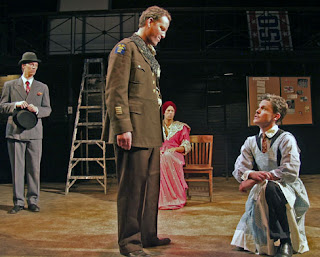Photo by Jonathan Slaff
Reviewed by Ilena GeorgeThe question of what it means to be a patriot during wartime has become increasingly relevant to our society. Seamus Heaney's new translation of Sophocles’ Antigone, explores this question, and works to sound out the resonance and parallels between the current American political landscape and King Creon's dictum of either obeying his mandates or being branded a traitor to Thebes. Director Alexander Harrington takes some risks in his interpretation of the ancient story, but it is Heaney's translation that stands out most notably in this otherwise uneven production.
Antigone, the doomed-since-birth daughter of Oedipus' accidental incest with his mother, insists on burying her brother Polyneices, killed while battling the city of Thebes. King Creon has declared Polyneices to be an enemy of the city, unworthy of burial, and Antigone refuses to accept this; she buries her brother and is buried alive as punishment for defying the king. Standout performances from Frank Anderson as Creon and Jessica Crandall as Antigone pit the two main characters against each other as worthy adversaries: Antigone has youth and religious conviction on her side while Creon relies on his position as all-powerful ruler. Antigone is an easy character to fall for, and despite Creon's poor rationale for his decisions, he still evokes pity as an old, stubbornly dogmatic man watching all he's worked and stood for ripped from him by a young girl.
Heaney’s poet’s eye provides a graceful lyricism to his translation that alternates between poetic description and accessible idiomatic speech. His interpretations of the choral sections were powerful when half-spoken and half-sung by the eleven members of the chorus; the words seemed meant for song. Except often the chorus' singing was underscored by Carman Moore's oddly upbeat-sounding music, which jarred with the tragic events the chorus described and lessened the words' impact. Overall, the play lacked cohesiveness; the chorus switched from its operatic recitations to different styles—including a section styled after spoken-word and one with a rhythm that seemed more appropriate for ballroom dance—that abutted each other and felt awkward and inconsistent. This was just one rough edge to the production; the staging was at times gauche—speeches delivered with the actor's back to the audience, chorus members placed in positions that blocked the audience's view of the stage—and it wasn't just Moore's music that was inconsistent in tone. The performances of the rest of the cast were not on the same level as the leads, both in terms of skill and in the style of delivery.
The bare-bones set and costumes, including cheekbone-highlighting face paint eerily reminiscent of death masks, were simple but effective, allowing Heaney's translation to remain the real focus of the show. For hardcore aficionados of the classics, that alone may make this production worthwhile. For those less devoted to ancient drama, a trip to Barnes and Nobles to browse Heaney's translation may suffice.
.........................................................................................................................................................................
The Burial at Thebes, translated by Seamus Heaney,
directed by Alexander Harrington.
January 25 - February 11, 2007
La MaMa E.T.C. (First Floor Theatre), 74A East Fourth Street
Thursday through Sunday at 8:00 pm plus Sunday matinees at 2:30 pm.
Tickets: $18, Box Office (212) 475-7710. Online ticketing available at www.lamama.org












.bmp)









